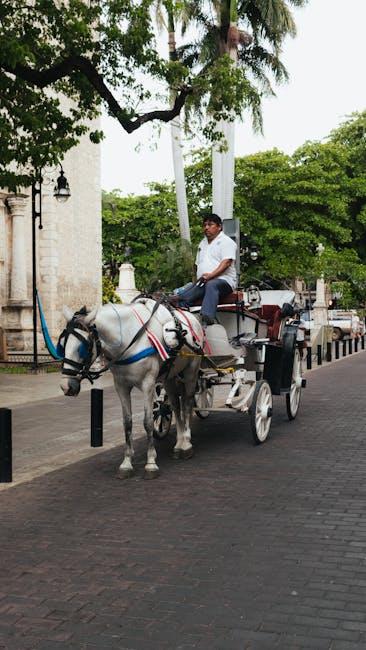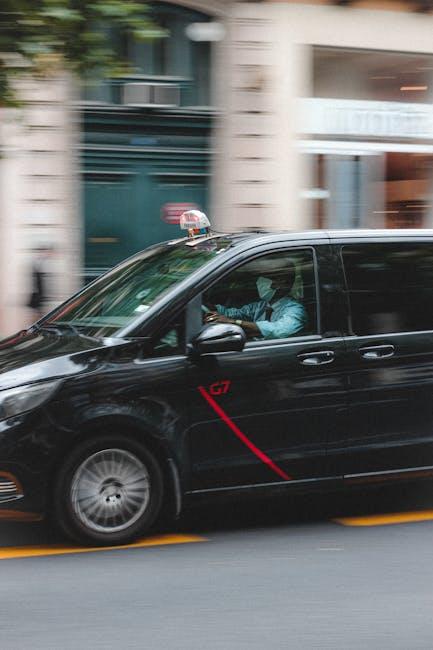In the rapidly evolving landscape of ridesharing, drivers are not just chauffeurs; they are entrepreneurs navigating the open road. As you embrace the flexibility and income potential of becoming a rideshare driver, one crucial aspect often overlooked is insurance. While sharing a ride can be thrilling, safeguarding yourself against unforeseen events is essential. This article delves into the top insurance options every rideshare driver needs to ensure peace of mind and secure their livelihood. From personal liability coverage to specialized rideshare policies, discover the essential protections that can keep you safe on the job and enable you to focus on delivering exceptional service to your passengers.
Understanding Rideshare Insurance: A Comprehensive Guide
Understanding rideshare insurance is crucial for anyone driving for services like Uber or Lyft. Regular car insurance typically does not cover you during rideshare activities, creating a potential financial loophole. Here’s what you need to know to protect yourself as a rideshare driver:
- Personal Auto Insurance: This is your primary coverage. However, it generally does not cover incidents that occur while driving for a rideshare company. Check with your provider to see if they offer any rideshare endorsements.
- Rideshare Insurance Add-Ons: Some insurance companies, such as Geico and State Farm, provide options to add rideshare coverage to your existing policy. This coverage usually bridges the gap for when you have the app on but have not yet accepted a ride.
- Rideshare-Specific Insurance: Companies like Allstate and Farmers offer policies specifically designed for rideshare drivers. These options provide full coverage during all periods of driving for the platform.
- Company Insurance Policies: While driving for a rideshare company, they typically provide some liability coverage, but only while you’re actively driving a passenger. It is essential to understand the limits and coverage provided by these companies.
Here’s a quick comparison of some popular rideshare insurance options:
| Insurance Provider | Type | Coverage Period | Average Cost |
|---|---|---|---|
| Geico | Add-On | App On, Not Driving | Varies |
| State Farm | Add-On | App On, Not Driving | Varies |
| Allstate | Rideshare Specific | All Driving Periods | Typically higher than standard rates |
| Farmers | Rideshare Specific | All Driving Periods | Competitive Pricing |
When choosing a rideshare insurance plan, consider the following:
- Coverage Limits: Ensure the policy meets state requirements and offers sufficient protection in case of an accident.
- Deductibles: Understand how much you’ll have to pay out-of-pocket before insurance kicks in, as this can vary significantly.
- Customer Feedback: Look for reviews or testimonials from other rideshare drivers regarding their experiences with the insurance provider.
Rideshare insurance isn’t a one-size-fits-all solution, so take your time to evaluate options that best fit your driving habits and financial needs.

Critical Coverage Types for Rideshare Drivers
When driving for rideshare services like Uber or Lyft, it’s essential to secure the right insurance coverage. Rideshare drivers often face unique risks that standard auto insurance may not cover. Here are the critical coverage types you should consider:
- Rideshare Insurance: This specialized policy fills the gaps between your personal auto insurance and what rideshare companies provide. It covers you from the moment you log into the app until you finish a ride.
- Liability Coverage: If you cause an accident while transporting passengers, liability coverage protects you from claims for bodily injury or property damage. Minimum limits vary by state but generally start at $25,000.
- Comprehensive and Collision Coverage: These cover your vehicle against theft, vandalism, and accidents, whether you’re at fault or not. Collision coverage is especially important, as rideshare apps often require it.
- Uninsured/Underinsured Motorist Coverage: This is crucial for protection against drivers who lack adequate insurance. If you’re injured by such a driver, this coverage helps cover medical expenses and lost wages.
- Personal Injury Protection (PIP): PIP covers medical expenses and lost income for you and your passengers, regardless of fault. This is an essential component, especially in no-fault states.
| Coverage Type | Description | Importance |
|---|---|---|
| Rideshare Insurance | Specialized coverage that protects against gaps in standard policies. | Essential for all rideshare drivers. |
| Liability Coverage | Covers bodily injury and property damage if you are at fault. | Mandatory in most states. |
| Comprehensive and Collision | Covers vehicle repairs and theft. | Required by rideshare companies. |
| Uninsured/Underinsured Motorist | Protects if involved in an accident with uninsured drivers. | Highly recommended for safety. |
| Personal Injury Protection (PIP) | Covers medical and income loss regardless of fault. | Very important in no-fault states. |
Understanding these coverage types is crucial to protect yourself, your passengers, and your livelihood. Make sure to discuss your specific needs with an insurance agent who understands the rideshare market, ensuring you get the best coverage tailored to your situation.

Essential Recommendations for Tailored Insurance Solutions
When it comes to finding the right insurance solutions for rideshare drivers, it’s essential to consider a few tailored recommendations that fit your unique needs. Rideshare driving can present various risks, and being adequately covered means you can focus on your passengers and driving without worrying about potential liabilities.
Understand Your Coverage Needs
Different insurance providers offer various levels of coverage. As a rideshare driver, you need to ensure your policy reflects:
- Comprehensive liability coverage to protect against claims of bodily injury or property damage.
- Collision coverage to cover damages to your car, regardless of fault.
- Personal injury protection (PIP) to cover medical expenses for you and your passengers.
- Uninsured/underinsured motorist coverage for protection if you’re in an accident with a driver who lacks sufficient insurance.
Compare Providers
Not all insurers cater specifically to rideshare drivers. Some recommended companies include:
- Geico: Known for competitive rates and specific rideshare insurance options.
- Progressive: Offers flexible coverage options and significant discounts for safe drivers.
- State Farm: Features tailored policies for rideshare drivers, including coverage extensions.
Check for Rideshare Endorsements
Some standard auto insurance policies may not provide coverage when you are logged into a rideshare app. Ensure you have a rideshare endorsement or a specific rideshare insurance policy:
- This endorsement extends your personal car insurance to cover you while working.
- It generally applies when the app is on, ensuring protection between trips as well.
Review Your Policy Regularly
Your circumstances may change over time. Make it a habit to:
- Review your insurance needs each year or after significant personal milestones.
- Contact your insurer to discuss any changes to your driving habits or vehicle status.
Utilize Discounts
Many providers offer discounts that can significantly lower premiums. Some common savings options include:
- Safe driving discounts for maintaining a clean driving record.
- Bundling insurance policies (e.g., home and auto) for a multi-policy discount.
- Low mileage or usage-based discounts for drivers who primarily use their vehicle for ridesharing.
Table: Key Insurance Features to Look For
| Feature | Description |
|---|---|
| Liability Coverage | Coverage for bodily injury and property damage claims from accidents. |
| Collision Coverage | Protects against damages to your vehicle, regardless of fault in an accident. |
| PIP Coverage | Covers medical expenses for you and your passengers, regardless of who is at fault. |
| Uninsured Motorist Coverage | Protection against accidents with drivers who lack adequate insurance. |

Navigating the Claims Process: What Rideshare Drivers Should Know
Understanding how to navigate the claims process is crucial for rideshare drivers. Accidents and incidents can happen at any time, and being prepared will help you manage the situation effectively. Here are essential steps and considerations to keep in mind:
- Document Everything: Start by collecting all relevant information at the scene. This includes:
- Date and time of the accident
- Location, weather conditions, and any traffic signals present
- Contact and insurance details of all parties involved
- Photos of the damage, accident scene, and license plates
- Notify Your Rideshare Company: As soon as it’s safe, inform your rideshare company (like Uber or Lyft) about the incident. They may require specific details to begin their own investigation and can guide you on next steps.
- Contact Your Insurance Provider: Reach out to your personal insurance provider as well as any rideshare-specific insurance you have. Discuss the details of the incident and file a claim. Be honest and thorough in your description.
- Understand Coverage Limits: Familiarize yourself with your insurance policy, especially ride-share coverage. Generally, there are three stages of liability:
- Offline Mode: When you’re not accepting rides; personal coverage applies.
- Waiting for Ride Request: Limited liability coverage is provided by the rideshare company.
- During a Ride: Comprehensive coverage usually applies during a trip, but check the specifics of your policy.
- Follow Up on Your Claim: Keep a record of all communications and documents related to your claim. If needed, follow up regularly with both your insurance company and rideshare platform to ensure your claim is being processed.
- Know Your Rights: As a driver, you have rights under state and federal law. Research your state’s specific regulations regarding rideshare driver insurance and liability. You may need a lawyer if complications arise.
Here’s a simple overview of types of insurance relevant to rideshare drivers:
| Type of Insurance | Coverage Details | Recommended Providers |
|---|---|---|
| Personal Auto Insurance | Covers personal driving but may exclude rideshare. | State Farm, Progressive |
| Rideshare Insurance | Bridges personal and commercial policies for rideshare use. | Farmers, Geico |
| Commercial Auto Insurance | Complete coverage when driving for hire. | Allstate, Liberty Mutual |
Having a solid understanding of the claims process can make a significant difference in how quickly you get back on the road. Make sure to stay organized and informed to protect yourself and your livelihood as a rideshare driver.

In Retrospect
As we navigate the intricate landscape of rideshare driving, selecting the right insurance is crucial for safeguarding your livelihood and ensuring peace of mind. Whether you’re a seasoned driver or just starting out, understanding your options-from liability coverage to comprehensive policies-can make all the difference in your daily journey. Remember, insurance is not just a legal requirement, but a protective shield against unforeseen challenges on the road. By investing in the right coverage, you’re not only protecting yourself but also your passengers and your vehicle. Drive smart, stay protected, and embrace the open road with confidence. Your safety and success depend on it.














